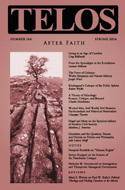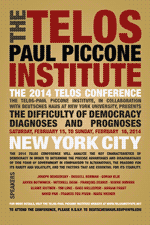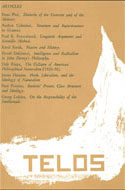By Robert Wyllie · Thursday, March 27, 2014 The following paper was presented at the Eighth Annual Telos Conference, held on February 15–16, 2014, in New York City.
Kierkegaard is the first to call modern Christians “pagans.” If Augustine’s critique of the Physicalists in the City of God was the last critique of ancient pagan time, Kierkegaard’s critique of our present “abstract infinity” is the first critique of modern pagan time. Augustine and Kierkegaard are like bookends on the complex sacred time of the Middle Ages.
Continue reading →
By Telos Press · Monday, March 24, 2014 At the recent Telos Conference in New York City, Telos Editor Russell A. Berman discussed the themes of the upcoming issues of the journal. Telos 166 (Spring 2014), which is now available, is entitled “After Faith” and addresses the endurance of religion despite the movement toward secularization. Telos 167, coming this summer, takes the related question “Are We Post-Secular” as its theme, and brings together a variety of contributions from around the world.
Continue reading →
By Telos Press · Friday, March 21, 2014 Telos Editorial Associate Jay Gupta recently spoke with C.S. Soong on Pacifica Radio’s Against the Grain, a show about politics, society, and ideas. Their conversation turned to ethics, objective vs. subjective truth, and the manner in which war is reported in the media. Listen the full interview at the Against the Grain website here.
Continue reading →
By Russell A. Berman · Wednesday, March 19, 2014 Telos 166 (Spring 2014) is now available for purchase in our store.
 According to the secularization thesis, religious faith should have long ago disappeared, overwhelmed by the forces of progress. Yet while explicit membership in denominational communities is certainly less an obligatory feature of contemporary culture than it was a generation or two ago, modes of religion still play important roles in aspects of social life. This issue of Telos explores some of the ramifications of this afterlife of faith. According to the secularization thesis, religious faith should have long ago disappeared, overwhelmed by the forces of progress. Yet while explicit membership in denominational communities is certainly less an obligatory feature of contemporary culture than it was a generation or two ago, modes of religion still play important roles in aspects of social life. This issue of Telos explores some of the ramifications of this afterlife of faith.
Continue reading →
By Pablo Bustinduy · Tuesday, March 18, 2014 The following paper was presented at the Eighth Annual Telos Conference, held on February 15–16, 2014, in New York City.
 Two french communist authors recently devoted a book to an attempt at the systematic demolishment of the logic of democracy. What makes their gesture interesting is that their critique of democracy is made in the very name of autonomy, equality, and emancipation, that is, of the very principles that democracy is supposed to promote and uphold. One usually knows how to react to attacks on democracy coming from the other side, from those who ground their arguments in a celebration of some sort of hierarchy principle, those who deduce the political from an ontology of violence, or aim at naturalizing orders and political differences. In those cases there is usually not much to be said at all, because anti-democratic arguments are usually not recognized as belonging to the same conversation as democratic ones: when they are actually heard, anti-democratic arguments are usually subject to different logics of validation, enunciation and justification than democratic ones. This is for instance what the notion of extremism generally does: to locate a voice or an argument outside of the recognized universe of discourse, and hence somehow deprived of an equal standing, possibly subject to some version of the old Jacobin motto: “there shall be no freedom for the enemies of freedom.” The paradox is interesting in itself, because it betrays the presence of a certain politics of thought and speech that is already at work way before we get to discuss in a rational process the truths of political forms, and yet has substantial effects on what is heard (and not heard) in the supposedly transparent sphere of public discourse. It also forces us to recognize the recurring, foundational role of the limit, of the gesture that at the same time opens up and delimits the space of what is possible and what is acceptable, which is often overlooked or simplified in the context of democratic theory. Two french communist authors recently devoted a book to an attempt at the systematic demolishment of the logic of democracy. What makes their gesture interesting is that their critique of democracy is made in the very name of autonomy, equality, and emancipation, that is, of the very principles that democracy is supposed to promote and uphold. One usually knows how to react to attacks on democracy coming from the other side, from those who ground their arguments in a celebration of some sort of hierarchy principle, those who deduce the political from an ontology of violence, or aim at naturalizing orders and political differences. In those cases there is usually not much to be said at all, because anti-democratic arguments are usually not recognized as belonging to the same conversation as democratic ones: when they are actually heard, anti-democratic arguments are usually subject to different logics of validation, enunciation and justification than democratic ones. This is for instance what the notion of extremism generally does: to locate a voice or an argument outside of the recognized universe of discourse, and hence somehow deprived of an equal standing, possibly subject to some version of the old Jacobin motto: “there shall be no freedom for the enemies of freedom.” The paradox is interesting in itself, because it betrays the presence of a certain politics of thought and speech that is already at work way before we get to discuss in a rational process the truths of political forms, and yet has substantial effects on what is heard (and not heard) in the supposedly transparent sphere of public discourse. It also forces us to recognize the recurring, foundational role of the limit, of the gesture that at the same time opens up and delimits the space of what is possible and what is acceptable, which is often overlooked or simplified in the context of democratic theory.
Continue reading →
By Matt Applegate · Thursday, March 13, 2014 As an occasional feature on TELOSscope, we highlight a past Telos article whose critical insights continue to illuminate our thinking and challenge our assumptions. Today, Matt Applegate looks at Paul Piccone’s “Students’ Protest, Class-Structure, and Ideology” from Telos 3 (Spring 1969).
 Paul Piccone’s 1969 essay “Students’ Protest, Class-Structure, and Ideology” captures the revolutionary ethos of that time in the United States. Hippies, student politics, Black Power, as well as the work of such figures as Régis Debray and Herbert Marcuse all come under Piccone’s earnest critical consideration. His primary concern, however, is the link between these student revolts and the state of education in the United States. On the one hand, Piccone is intent on charting the means by which hyper-industrialization and the technologization of work lead to open student rebellion. On the other, he is interested in understanding why student rebellion is effective in relation to other forms of revolutionary organization that appear alongside it. Paul Piccone’s 1969 essay “Students’ Protest, Class-Structure, and Ideology” captures the revolutionary ethos of that time in the United States. Hippies, student politics, Black Power, as well as the work of such figures as Régis Debray and Herbert Marcuse all come under Piccone’s earnest critical consideration. His primary concern, however, is the link between these student revolts and the state of education in the United States. On the one hand, Piccone is intent on charting the means by which hyper-industrialization and the technologization of work lead to open student rebellion. On the other, he is interested in understanding why student rebellion is effective in relation to other forms of revolutionary organization that appear alongside it.
Continue reading →
|
|
 According to the secularization thesis, religious faith should have long ago disappeared, overwhelmed by the forces of progress. Yet while explicit membership in denominational communities is certainly less an obligatory feature of contemporary culture than it was a generation or two ago, modes of religion still play important roles in aspects of social life. This issue of Telos explores some of the ramifications of this afterlife of faith.
According to the secularization thesis, religious faith should have long ago disappeared, overwhelmed by the forces of progress. Yet while explicit membership in denominational communities is certainly less an obligatory feature of contemporary culture than it was a generation or two ago, modes of religion still play important roles in aspects of social life. This issue of Telos explores some of the ramifications of this afterlife of faith.  Two french communist authors recently devoted a book to an attempt at the systematic demolishment of the logic of democracy. What makes their gesture interesting is that their critique of democracy is made in the very name of autonomy, equality, and emancipation, that is, of the very principles that democracy is supposed to promote and uphold. One usually knows how to react to attacks on democracy coming from the other side, from those who ground their arguments in a celebration of some sort of hierarchy principle, those who deduce the political from an ontology of violence, or aim at naturalizing orders and political differences. In those cases there is usually not much to be said at all, because anti-democratic arguments are usually not recognized as belonging to the same conversation as democratic ones: when they are actually heard, anti-democratic arguments are usually subject to different logics of validation, enunciation and justification than democratic ones. This is for instance what the notion of extremism generally does: to locate a voice or an argument outside of the recognized universe of discourse, and hence somehow deprived of an equal standing, possibly subject to some version of the old Jacobin motto: “there shall be no freedom for the enemies of freedom.” The paradox is interesting in itself, because it betrays the presence of a certain politics of thought and speech that is already at work way before we get to discuss in a rational process the truths of political forms, and yet has substantial effects on what is heard (and not heard) in the supposedly transparent sphere of public discourse. It also forces us to recognize the recurring, foundational role of the limit, of the gesture that at the same time opens up and delimits the space of what is possible and what is acceptable, which is often overlooked or simplified in the context of democratic theory.
Two french communist authors recently devoted a book to an attempt at the systematic demolishment of the logic of democracy. What makes their gesture interesting is that their critique of democracy is made in the very name of autonomy, equality, and emancipation, that is, of the very principles that democracy is supposed to promote and uphold. One usually knows how to react to attacks on democracy coming from the other side, from those who ground their arguments in a celebration of some sort of hierarchy principle, those who deduce the political from an ontology of violence, or aim at naturalizing orders and political differences. In those cases there is usually not much to be said at all, because anti-democratic arguments are usually not recognized as belonging to the same conversation as democratic ones: when they are actually heard, anti-democratic arguments are usually subject to different logics of validation, enunciation and justification than democratic ones. This is for instance what the notion of extremism generally does: to locate a voice or an argument outside of the recognized universe of discourse, and hence somehow deprived of an equal standing, possibly subject to some version of the old Jacobin motto: “there shall be no freedom for the enemies of freedom.” The paradox is interesting in itself, because it betrays the presence of a certain politics of thought and speech that is already at work way before we get to discuss in a rational process the truths of political forms, and yet has substantial effects on what is heard (and not heard) in the supposedly transparent sphere of public discourse. It also forces us to recognize the recurring, foundational role of the limit, of the gesture that at the same time opens up and delimits the space of what is possible and what is acceptable, which is often overlooked or simplified in the context of democratic theory.  Paul Piccone’s 1969 essay
Paul Piccone’s 1969 essay 

